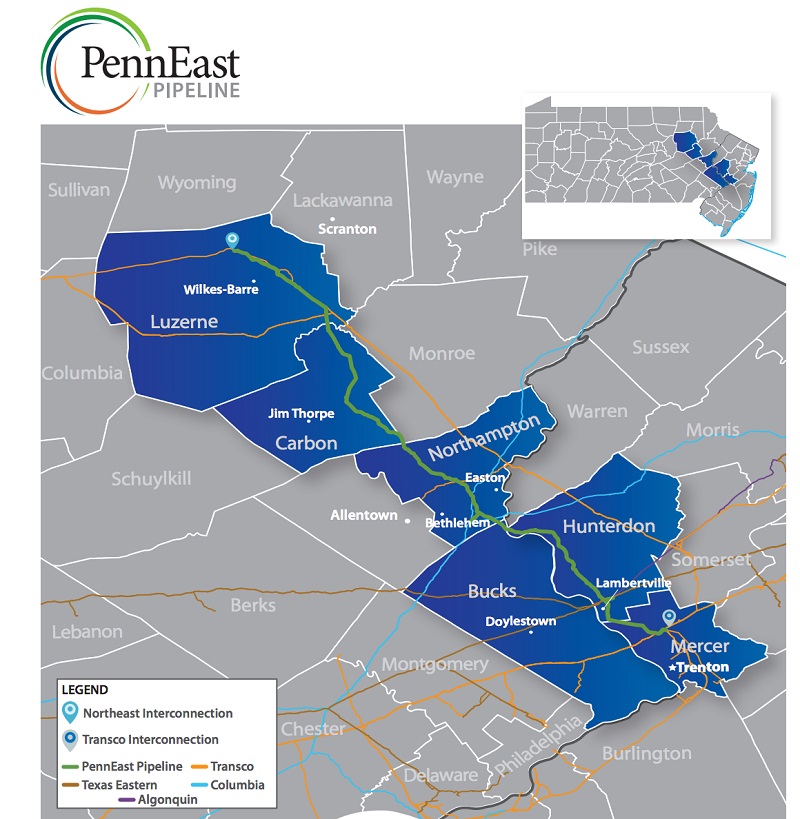U.S. Supreme Court Backs PennEast Pipeline in New Jersey Land Dispute
WASHINGTON (Reuters) — The U.S. Supreme Court on Tuesday ruled in favor of a consortium of energy companies including Enbridge Inc seeking to seize land owned by New Jersey to build a federally approved natural gas pipeline despite the state's objections, though hurdles remain for the $1 billion project.
The 5-4 ruling, authored by conservative Chief Justice John Roberts, handed a victory to PennEast Pipeline Company LLC, a joint venture seeking to build the 116-mile (187-km) pipeline from Pennsylvania to New Jersey. The justices overturned a lower court ruling in favor of New Jersey's government.
Other companies joining Enbridge in the consortium include South Jersey Industries Inc, New Jersey Resources Corp (NJR), Southern Co and UGI Corp.
The decision enables interstate pipelines to move forward with efforts to seize state-owned lands without a state's consent as long as federal regulators have approved the project. But New Jersey Attorney General Gurbir Grewal said the ruling does not bring an end to the state's fight against the PennEast project.
"We still have other, ongoing legal challenges to this proposed pipeline, which is unnecessary and would be destructive to New Jersey lands. I am proud to continue this fight on behalf of our residents, and I urge the federal government to take another look at this harmful proposal," Grewal added.
PennEast wants the land to build a pipeline designed to deliver 1.1 billion cubic feet per day of gas - enough to supply about 5 million homes - from the Marcellus shale formation in Pennsylvania to customers in Pennsylvania and New Jersey.
PennEast said it plans to put the first phase of the project - about 68 miles (110 km) of pipe in Pennsylvania - into service in 2022 and is targeting completion of the second phase - the line from Pennsylvania into New Jersey - in 2023.
"We are pleased that the Supreme Court kept intact more than seven decades of legal precedent for the families and businesses who benefit from more affordable, reliable energy. This decision is about more than just the PennEast project," said Anthony Cox, chair of the PennEast board of managers.
Amy Andryszak, president and CEO of the Interstate Natural Gas Association of America (INGAA), said the organization is pleased with the Supreme Court's decision.
"As the Court acknowledges, the Natural Gas Act has made possible the growth of our nation’s pipeline infrastructure to serve communities across our country," Andryszak said in a statement. “Our nation’s interstate natural gas pipelines make up a vast and critical transportation network, moving approximately one-third of the energy consumed in the United States. In order to continue to harness the benefits of natural gas to achieve our energy and climate goals, we need a predictable regulatory framework that allows improvements and additions to our country’s interstate natural gas transmission infrastructure.”
The court ruled that a 1938 U.S. law called the Natural Gas Act that lets private energy companies seize "necessary" parcels of land for a project if they have obtained a certificate from the Federal Energy Regulatory Commission (FERC) can be applied to state-owned land. The law effectively gives private companies the power of eminent domain in which government entities can take property in return for compensation.
"Specifically, we are asked to decide whether the federal government can constitutionally confer on pipeline companies the authority to condemn necessary rights-of-way in which a state has an interest. We hold that it can," Roberts wrote for the court.
The court, which has a 6-3 conservative majority, was divided on non-ideological lines. Roberts was joined in the majority by two conservative justices, Samuel Alito and Brett Kavanaugh, and two liberals, Stephen Breyer and Sonia Sotomayor.
Roberts wrote that the U.S. Constitution's 11th Amendment, which prevents courts from hearing certain lawsuits against states, does not bar the lawsuit, as the state had argued.
FERC in 2018 approved PennEast's request to build the pipeline. The company then sued to gain access to properties along the route.
New Jersey did not consent to PennEast's seizure of properties that the state owns or in which it has an interest.
After a federal judge approved the property seizure, the Philadelphia-based 3rd U.S. Circuit Court of Appeals ruled in 2019 that PennEast could not use federal eminent domain to condemn land controlled by the state, prompting the appeal to the Supreme Court.
U.S. House of Representatives Energy and Commerce Committee Chairman Frank Pallone said the ruling set a dangerous precedent and vowed to work to preserve state property rights.
"States like New Jersey should be able to retain their right to do what they wish with the lands they own, and no private actor - including pipeline companies - should be able to usurp that right," the New Jersey Democrat said.
Related News
Related News

- Keystone Oil Pipeline Resumes Operations After Temporary Shutdown
- Biden Administration Buys Oil for Emergency Reserve Above Target Price
- Freeport LNG Plant Runs Near Zero Consumption for Fifth Day
- Enbridge to Invest $500 Million in Pipeline Assets, Including Expansion of 850-Mile Gray Oak Pipeline
- Williams Delays Louisiana Pipeline Project Amid Dispute with Competitor Energy Transfer
- Evacuation Technologies to Reduce Methane Releases During Pigging
- Editor’s Notebook: Nord Stream’s $20 Billion Question
- Enbridge Receives Approval to Begin Service on Louisiana Venice Gas Pipeline Project
- Russian LNG Unfazed By U.S. Sanctions
- Biden Administration Buys Oil for Emergency Reserve Above Target Price





Comments